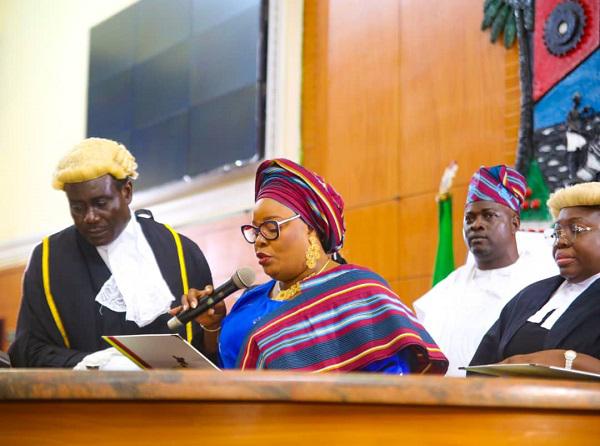The political landscape of Lagos State witnessed a significant shift with the unexpected removal of Mudashiru Obasa as Speaker of the Lagos State House of Assembly and the subsequent appointment of Mrs. Mojisola Meranda, marking a historic moment as the first female Speaker of the Assembly. This transition, while surprising, has been met with cautious optimism by the Inter-Party Advisory Council (IPAC) in Lagos State, the umbrella body of all registered political parties in the state. While celebrating Meranda’s ascension, IPAC has also offered crucial advice, emphasizing the importance of inclusivity, transparency, and a strong working relationship with all political stakeholders.
Mrs. Temilola Akinade, the Chairperson of IPAC in Lagos State, expressed her support for Meranda’s appointment, highlighting the growing representation of women in positions of power. This sentiment reflects a broader societal push for greater inclusivity and gender equality in political leadership. Akinade’s endorsement, however, comes with a crucial caveat: a call for Meranda to learn from the downfall of her predecessor. This advice underscores the importance of ethical conduct, accountability, and a collaborative approach to governance, all of which appear to have been factors in Obasa’s removal.
The circumstances surrounding Obasa’s removal remain somewhat shrouded in ambiguity, with allegations of “gross misconduct” being the official reason cited by the 32 out of 40 lawmakers who voted for his impeachment. The speed and decisiveness of the impeachment process, coupled with the simultaneous dissolution of all principal positions and standing committees, and the suspension of the Clerk of the Assembly, suggest a deeper, perhaps more systemic, issue within the Assembly. While the specific details of Obasa’s alleged misconduct have not been publicly disclosed, the events suggest a potential power struggle within the Assembly and raise questions about transparency and accountability in the legislative process.
The swift appointment of Meranda and Fatai Adebola as Speaker and Deputy Speaker respectively, signifies a swift attempt by the Assembly to restore stability and project an image of continuity. However, the true test of this new leadership will lie in their ability to address the underlying issues that led to Obasa’s downfall. Meranda, in particular, faces the daunting task of not only leading the Assembly but also restoring public trust in the wake of this political upheaval. Her success will hinge on her ability to navigate the complex political landscape, build consensus among her colleagues, and demonstrate a commitment to ethical and transparent governance.
IPAC’s advice to Meranda to avoid the pitfalls that led to Obasa’s removal offers a roadmap for her leadership. The emphasis on inclusivity—carrying all 39 lawmakers along in all dealings and activities—suggests a need for greater collaboration and shared decision-making within the Assembly. This approach contrasts sharply with the perceived unilateralism of Obasa’s leadership style, which may have contributed to his downfall. Furthermore, the call for Meranda to recognize and engage with other political parties through IPAC highlights the importance of building bridges and fostering a more inclusive political environment.
Beyond the immediate political context, Meranda’s appointment represents a significant milestone for women’s representation in Nigerian politics. Her rise to the position of Speaker is a testament to the growing influence of women in leadership roles and serves as an inspiration for future generations of female politicians. However, her success will not only be measured by her ability to effectively lead the Assembly but also by her ability to pave the way for greater female participation in politics. Her leadership will be closely scrutinized, and her performance will undoubtedly have implications for the broader movement towards greater gender equality in Nigerian politics. The challenges before her are significant, but so is the opportunity to reshape the political landscape of Lagos State.














